Welsh Housing Awards 2025
Read all the shortlisted entries into this award category, working in partnership, at the Welsh Housing Awards (WHA) 2025 and find out who won the award on the night.
This award recognises partnership and collaboration across the housing spectrum.
Winning project name
LENS WHQS animation videos
Winning organisation
Hafod
Partner organisations
Hafod, Newydd, Bron Afon, Beacon, Cadwyn, Cynon Taf, Vale Homes, V2C, CCHA, and Trivallis
Statement of support
The Landlord Engagement Network South-Wales (LENS) exemplifies the power of collaboration and partnership to deliver real change for tenants. Bringing together ten social landlords Hafod, Newydd, Bron Afon, Beacon, Cadwyn, Cynon Taf, Vale Homes, V2C, CCHA, and Trivallis, this innovative project harnessed shared skills and resources to co-produce engaging communications on the Welsh Housing Quality Standard (WHQS 2023), supporting thousands of tenants across South Wales to better understand and engage with the improvements coming to their homes.
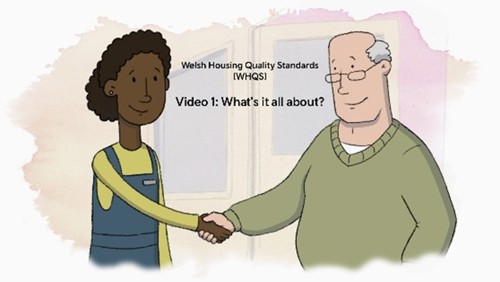
Innovative partnership approach
LENS, originally a tenant scrutiny network, evolved into a dynamic collaboration platform addressing cross-landlord challenges. The WHQS video project stemmed from a shared recognition that traditional letters and leaflets were not effectively engaging tenants with upcoming WHQS changes. Instead of each landlord commissioning separate campaigns, partners agreed to pool budgets and expertise to create a joint solution: four high-quality animated videos, fully bilingual, accessible, and co-produced with tenants.
Innovation was at the heart of this partnership:
- Using animation and visual storytelling to make complex information clear and engaging.
- Hosting a tenant workshop to ensure messaging was shaped by lived experience.
- Leveraging AI and creative staff volunteers to refine scripts and ensure clarity within tight timeframes.
- Sharing costs and resources, demonstrating a best-practice model for achieving more collectively for less.
Service improvement
By collaborating, the landlords produced a unified, professional communications toolkit that:
- Explains what WHQS means for tenants, what works will be carried out, and how it will improve their homes and wellbeing.
- Covers key tenant concerns such as safety, disruption, costs, accessibility, and environmental benefits.
- Provides assurances around standards, support, and timescales for improvements.
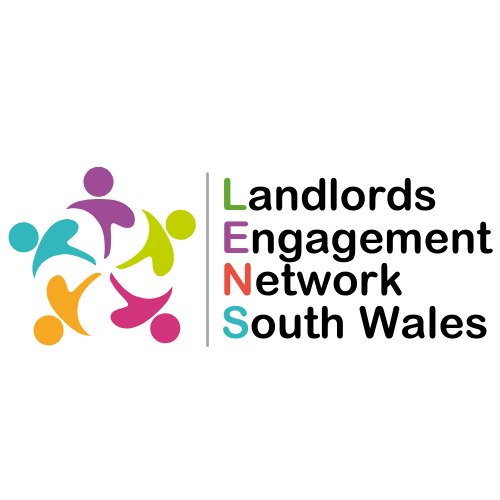
The project has strengthened tenant trust and engagement by demonstrating that their voices directly shaped the resources. The inclusive content, Welsh language, subtitles, diverse characters ensure broad accessibility, including tenants with additional needs.
Best practice in partnership working
The project represents best practice by:
- Pooling resources for cost-effective outcomes (animations and training delivered at a fraction of individual commissioning costs).
- Empowering tenants to influence communication tools for an entire region, rather than for one landlord.
- Building sector capacity as staff gained new skills in co-production, scriptwriting, and digital communication.
This shared approach improves the wellbeing of communities by reducing confusion, increasing engagement with home improvements, and fostering a sense of inclusion in the journey towards better, safer, and more sustainable homes.
Impact and legacy
The videos are now being rolled out across multiple social media channels, websites, newsletters, and direct mailers. Early analytics show strong engagement, with hundreds of views per video and positive tenant feedback such as:
- “Short, clear, and easy to understand, these make WHQS feel real to me as a tenant.”
This partnership has not only delivered a successful project but has laid the groundwork for future collaborative initiatives, demonstrating that when social landlords and tenants work together, they can achieve sector-leading results.
By innovating, sharing expertise, and truly listening to tenants, LENS has delivered a high-impact project that improves understanding, enhances trust, and sets a benchmark for collaborative communication in the housing sector.
Outcomes and achievements
The WHQS video project has already achieved significant outcomes for tenants and partners:
- Four co-produced bilingual animations launched across 10 landlord partners, reaching thousands of tenants across South Wales. e.g. Newydd viewing figures are 1,828 with an average engagement of 95 per video.
- High tenant engagement achieved through workshops, script input, and early positive feedback highlighting clarity, reassurance, and ease of understanding.
- Efficient use of resources by pooling budgets, sharing staff skills for scriptwriting and translation, and leveraging existing TPAS Cymru training allocations for the tenant workshop.
- Digital reach and engagement: Early social media analytics show hundreds of views per video, high engagement rates, and growing tenant awareness of WHQS.
- Capacity building and legacy: Staff gained new creative and co-production skills, and the animations now form a reusable, sector-wide communication toolkit.
The project has strengthened tenant confidence and inclusion in the WHQS journey while improving cross-landlord collaboration. It demonstrates how shared innovation can deliver better services and outcomes for communities, ensuring tenants feel informed, supported, and valued as homes are upgraded for safety, comfort, and sustainability.
Shortlisted entries
Care & Repair Cymru - Managing Better
Application entry
- Project name: Managing Better
- Lead organisation: Care & Repair Cymru
- Partner organisations: RNIB Cymru, RNID, Alzheimer’s Society Cymru, Stroke Association Wales
Statement of support
The Managing Better Project supports older people with disabilities to remain living independently in their own home.
Through a partnership with four other Welsh charities — RNIB Cymru, RNID, Alzheimer’s Society Cymru, and Stroke Association Wales — the project specifically supports people over 50 who have hearing loss, sight loss, dementia or who have had a stroke.
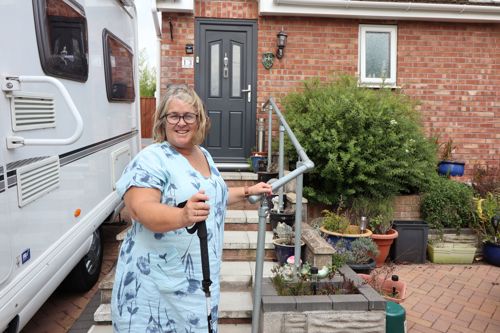
The project is based around a free home visit, conducted by managing better caseworkers, who asses the home and its suitability for the occupant before suggesting solutions that will support safety and independent living. The caseworkers are upskilled by the partners and are embedded into local Care & Repair services, so that repairs and adaptations can happen quickly for the people who need them most.
The project supports people like Dai, who has lived in rural Ceredigion for over 50 years. His health is starting to fail, but he doesn’t want to move away from the home and community he loves.
Dai bought his house for just £350 in 1965, and he’s proud to still live there. Care & Repair sent managing better caseworker Heulwen to see how the project could help him.
After visiting Heulwen said: “Dai has got hearing loss, so one of the things that he was struggling with was hearing his doorbell. So, I ordered him a hard-of-hearing doorbell which also has flashing lights on it, and he can take this and plug it in anywhere in his property. If he doesn’t actually hear the doorbell, he’ll see the flashing lights.”
Dai was also struggling getting in and out of his bath, so Heulwen referred him to occupational therapy with a recommendation for disabled facilities grant for bathroom adaptations. Shortly after this a new wet room shower was installed for Dai, meaning he was able to wash without fear of falling.
Dai said: “Care & Repair has helped me because coming out of the bath before I had to have a step, and I was dead scared that would I lose my balance and fall.”
Heulwen and the other managing better caseworkers are connected to the partner organisations and can refer to them when necessary. However, as Heulwen has received the training from all four partners her expertise often means her one visit stops the need for multiple health and charity professionals from making the same visit.
The project is also innovative when using technology to support clients. For example, the project received funding from Wales & West Utilities to distribute accessible CO alarms. Deaf people are unable to hear a traditional CO alarm, so accessible alarms connect to a wristwatch and pillow shaker to alert of possible danger. The project has also helped older people who have sight loss to use smart speakers to contact family, turn on the heating or play music.
Additionally, managing better caseworkers help clients to check what benefits they are entitled to and help to apply for them.
The Managing Better project started in 2016 and is funded by the Welsh government’s Sustainable Social Services Third Sector Grants.
Managing Better is a critical prevention service for people with complex needs. The preventative interventions reduce hospital admissions and therefore help ease the strain on health and social care in Wales.
Outcomes and achievements
Last year (2024-25), the Managing Better project supported over 3,000 people to live safely and independently at home. In 2024-25 the project achieved the following:
- 3,316 people supported
- 2,825 Healthy Home Checks completed
- 2,219 clients with sensory loss helped
- 473 clients living with dementia or recovering from a stroke helped
- £1.097 million worth of works completed in people’s homes
- £91,768 in benevolent funding accessed
- £1.9 million in welfare benefits secured for clients
- 1,424 clients had technology installed that would help them
- 1,781 referrals made to other organisations.
Hedyn - Tredegar Park Primary & Hedyn: A Collaborative Model for Community-Focused Education
Application entry
- Project name: Tredegar Park Primary & Hedyn: A Collaborative Model for Community-Focused Education
- Lead organisation: Hedyn
- Partner organisations: Tredegar Park Primary & Vial Energi
Statement of support
In response to increasing social and economic pressures, Tredegar Park Primary School working in close partnership with Hedyn’s Communities Team has redefined its role as a community-focused school. Together, they have developed a collaborative model that places inclusive education, wellbeing, and regeneration at the heart of their work.
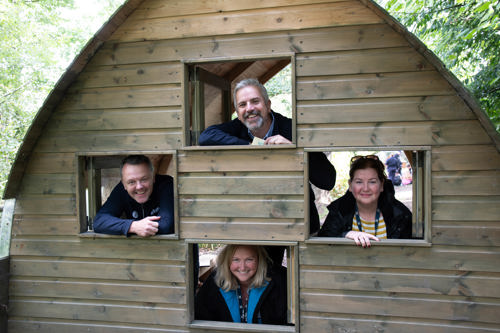
This submission highlights how Hedyn and Tredegar Park Primary have gone above and beyond to support children, families, and the wider community. Through strategic collaboration, nature-based learning, and practical skills development, they have created a series of initiatives that directly address local challenges and deliver long-term impact.
Tredegar Park Primary serves a diverse community in Newport, where many families face barriers such as economic hardship, social isolation, and limited access to opportunity. The school has experienced a rise in behavioural and emotional needs among pupils, alongside a growing demand for therapeutic and inclusive learning environments.
Recognising the potential of its underused spaces and strong community relationships, the school sought to transform its environment and approach. Hedyn’s communities team provided the strategic support needed, embedding its collaboration commitment, Asset-Based Community Development [ABCD] and Social Value approach.
Through ABCD, Hedyn worked with school leaders, staff, families, and local partners to identify and mobilise existing assets, ensuring that efforts were community-led and responsive to real needs. Hedyn’s Social Value strategy enabled the school to access contractor support, donated materials, and professional expertise, all without additional financial burden. These contributions were grounded in shared values and a commitment to long-term community benefit.
By integrating procurement and community engagement into a single delivery model, Hedyn ensured that every contract became an opportunity to deliver social value. This strategic approach allowed the school to unlock new resources, build lasting partnerships, and create inclusive spaces that support learning, wellbeing, and community pride. Together, Hedyn and Tredegar Park Primary have delivered a suite of impactful initiatives:
Nurture Farm
A therapeutic space where pupils care for animals alongside staff and local vets—supporting emotional regulation, responsibility, and wellbeing. The farm also serves wider site users including Flying Start families, Duffryn Youth Club, and St Woolos Primary School.
Alternative Occupations Project
Pupils engage in woodwork, gardening, clay, and sewing—developing practical skills and confidence, and exploring pathways beyond university or unemployment.
Volunteer programme
Families and residents are welcomed into the school to support gardening, woodwork, and classroom activities. Supported by Adult Learning Wales, Multiply, and ABUHB, the programme creates pathways into employment and shifts perceptions of school as a welcoming, empowering space.
Edible education
Pupils learn to grow, cook, and share food—building financial awareness, sustainability skills, and pride in their community, while supporting others through food-based activities.
Bike Project (Exclusion Diversion)
A creative initiative for pupils with behavioural challenges, offering mechanical skills and business awareness through bike repair and community donation—reducing exclusions and supporting the school’s Green Flag status.
Family Forest School
An unused section of the site is being transformed into a nature-based learning space with benches and a bell tent. It will host sessions for Flying Start families, Rabbit Hill Childcare, and community groups like Brownies and Rainbows.
These initiatives have positively impacted over 600 individuals, including 530 pupils and 50 staff, as well as families from partner organisations. The collaboration has reduced exclusions, improved wellbeing, increased parental engagement, and strengthened the school’s role as a trusted community anchor.
In a time of uncertainty, Tredegar Park Primary and Hedyn have shown what is possible when organisations work together with purpose, creativity, and compassion—setting a benchmark for community-led education and regeneration.
Outcomes and achievements
Impact and outcomes
These initiatives have directly benefited over 600 individuals, including:
- 530 pupils at Tredegar Park Primary
- 50 staff members
- Families and staff from partner organisations
- Wider community groups accessing the site.
The wider impact also includes:
- Reduced exclusions and improved emotional regulation
- Enhanced wellbeing for pupils and staff
- Increased parental engagement and community involvement
- New pathways into employment through volunteering and skills development
- Improved perceptions of the school as a community hub
- Sustainable use of resources through strategic procurement and social value delivery.
This work is a model of collaborative working at its best. Hedyn and Tredegar Park Primary have co-designed every initiative, engaged multiple stakeholders, and built a shared vision for inclusive education and community regeneration.
Monmouthshire Housing Association - Holman House, Caldicot
Application entry
- Project name: Holman House, Caldicot
- Lead organisation: Monmouthshire Housing Association
Statement of support
Overview of the partnership
Holman House stands as a powerful example of how cross-sector collaboration can reinvigorate a community asset. By bringing together public sector bodies, commercial stakeholders, and national service providers, the project has delivered meaningful improvements in local services, environmental performance, and town centre vitality.
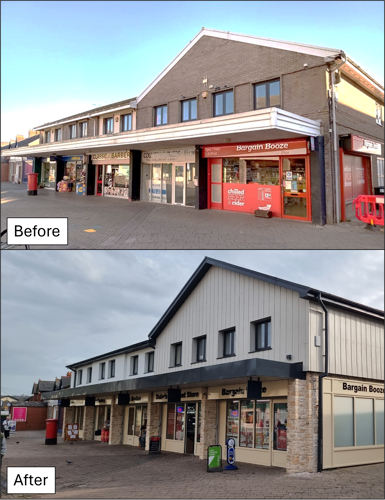
Innovative partnership working
- Collaborative vision: The partnership united MHA, five commercial leaseholders, MCC, Welsh government, and the Post Office to deliver a shared vision for Holman House, balancing commercial viability with community benefit.
- Restoration of essential services: A major success was the reintroduction of a Post Office, a vital service previously lost to the community, achieved through joint efforts between MHA, MCC, and Post Office Ltd.
- Sustainable retrofit: The building was upgraded with solar PV technology and energy efficiency measures. In just three months, the system has exported over five megawatt-hours of electricity to the grid, enough to power two average homes for a year, whilst dramatically reducing tenant energy bills from £200 to £30 per month.
Enhanced service delivery and quality
- Improved accessibility: The reinstated Post Office has restored access to essential services, particularly benefiting vulnerable and elderly residents.
- Energy performance: Holman House now boasts significantly improved energy ratings, reducing both carbon emissions and operational costs.
- Carbon reduction: The solar installation has already offset a substantial portion of the carbon used during construction, with ongoing benefits to the grid and the environment.
Town centre regeneration
Holman House has become a cornerstone of Caldicot’s town centre renewal, driving footfall, business confidence, and civic pride.
- Visual transformation: The building has undergone a full external upgrade, including external wall insulation, modern cladding and render finishes, new windows, doors, and shopfronts. The previously dominant canopy has been redesigned, giving the building a contemporary and welcoming presence.
- Economic impact: By attracting a mix of commercial and residential tenants, the project has stimulated local trade and supported independent businesses and residential tenants.
- Strategic fit: The regeneration aligns with MCC’s broader town centre strategy and Welsh government’s placemaking objectives, showcasing how targeted investment and partnership working can deliver lasting urban renewal.
Best practice and community wellbeing
- Community impact: The project has restored a key community hub, improving access to services and enhancing the town’s identity.
- Scalable model: Holman House offers a replicable framework for other regeneration projects, demonstrating how diverse partners can work together to achieve shared goals.
- Environmental leadership: The solar performance and carbon offsetting data provide a transparent and measurable example of sustainable retrofit success.
Conclusion
Holman House is more than a regeneration project; it’s a testament to the power of partnership. Through innovative collaboration, the scheme has revitalised a key town centre asset, restored essential services, improved environmental performance, and delivered lasting benefits to the local community. It exemplifies best practice in partnership working across the housing and regeneration spectrum.
Outcomes and achievements
The Holman House project in Caldicot has delivered transformative outcomes through a unique partnership between Monmouthshire Housing Association, Monmouthshire County Council, Welsh government, five commercial leaseholders, and Post Office Ltd. A key achievement was the reinstatement of the town’s Post Office, restoring vital services and improving accessibility for vulnerable residents.
The building has undergone a comprehensive refurbishment, featuring external wall insulation, upgraded shopfronts, and a newly designed canopy all contributing to a noticeable uplift in the town centre’s appearance.
The building is entirely off gas, relying solely on electricity for heating and energy needs. Energy performance has seen major gains with the new solar PV installation. It has produced over 67 megawatt hours of electricity, with more than seven megawatt hours fed back into the grid, enough to power almost three homes for an entire year. This equates to saving 32 tonnes of coal and CO2 emissions or planting 42 trees. Tenants have seen their average energy bills fall dramatically, from £200 to just £30 per month. Impressively, the residential element of the building is currently generating more energy than it consumes, achieving net zero energy status within just three months.
Holman House now serves as a catalyst for town centre regeneration, boosting footfall, supporting independent businesses, and aligning with wider placemaking strategies. The project demonstrates best practice in sustainable retrofit, community engagement, and multi-stakeholder collaboration. It offers a replicable model for delivering social, economic, and environmental value through partnership working.
Isle of Anglesey County Council - Plas Alltran Redevelopment
Application entry
- Project name: Plas Alltran Redevelopment
- Lead organisation: Isle of Anglesey County Council
- Partner organisations: Cadw, Welsh Government (Social Housing Grant, Transforming Towns) Housing Services
Statement of support
Plas Alltran is a Grade II Listed building situated adjacent to the port in Holyhead, the building is in a central location, which means that many people on a daily basis see it. This important historical building had fallen into disrepair and was at risk due to neglect and decay from previous owners. It was included in the Victorian Society’s Top 10 most endangered buildings in England and Wales in 2020 and Cadw identified it as a Building at Risk in 2001.

It did not befit as an appropriate landmark to welcome those arriving by the port and was subject to vandalism and anti-social behaviour for over 20 years. With many council services such as planning, housing and environmental health receiving regular complaints from the local community, with Councillors urging action. Fire and Police were called regularly due to fires and anti-social behaviour. The determination of the empty homes team was instrumental in securing Plas Alltran. Despite the property's complex ownership history, the team went to extraordinary lengths to trace and correspond with the previous owner in South Korea. Their persistence led to a successful purchase by agreement, avoiding the lengthy and costly Compulsory Purchase Order process— demonstrating both innovation and commitment to preserving heritage while responding to community concerns.
The gothic style contributes to the character of the town at a gateway location. It was commissioned by Jane Henrietta Adeane (O.B.E), a niece of Hon. W.O Stanley of Penrhos, in 1890-1891 as part of her redevelopment of the Blackbridge. It was originally built as a doctor’s surgery for Dr William Fox Russell, who lived and worked there.
The house was later rented by a succession of families and individuals including Captain Edward Butler Tanner (O.B.E) of the H.M.S Tara. It has been reported that during the First World War, the building was a first aid post and soup kitchen and in the 1930s served as a convalescence home for Tuberculosis sufferers.
With the buildings history of helping people in need the transformation is fitting in creating four new one-bedroom homes, designed for single and two-person households, fulfilling a housing need in the area. Historic building conservation specialists Recclesia, M&E specialists Hulley & Kirkwood, structural engineers Caulmert, and BTP Architects worked alongside Isle of Anglesey County Council to deliver the project over two years.
The sensitive restoration has preserved much of the building’s historic character, while introducing modern energy-efficient measures to meet residents’ needs.
By working un partnership with our economic development team who worked on the options appraisal, this assisted in leveraging grant allocations from Transforming Towns and Cadw.
Housing collaborated closely with key partners such as Cadw, to agree on restoration methods and materials. Original external walls and slate tiles were retained wherever possible, with lost features such as door mouldings, cornices, and stair spindles carefully recorded and faithfully replicated using traditional methods of craftsmanship.
It's status meant that windows needed to be preserved, so a standard ventilation system could not be fitted. Instead, a modern Mechanical Ventilation with Heat Recovery (MVHR) system was installed as the most practical energy energy-efficient ventilation system. Insulated lime plaster was used internally, which provides exceptional heat retention to the building and reduced carbon emissions.
Andy, director at BTP Architects, said: “it is a fantastic example of how careful restoration, mindful design and successful partnership working can come together to create sustainable, affordable homes it safeguards Holyhead’s heritage whilst creating affordable homes. Every element of the design was considered not just for its conservation value, but for how it could support the wellbeing, dignity, and future of its residents.”
Outcomes and achievements
Appreciation from the community was demonstrated during Cadw’s opendoors event in September 2024 with over 100 people attendants who shared their memories of the building. They recognised old details in the layout, recalled which floor they had lived on, and even brought photographs showing the original wallpaper. Some spoke fondly of their time there, while others passed on stories they had heard from others. Some remembered attending a dance school, while many more told us how they had always longed to step inside this building—one that, for as long as they could remember, had stood in disrepair.
- “This development provides high quality, affordable homes in the heart of the community, while also bringing a treasured local building back into use. It reflects our wider commitment to delivering housing that meets real need, in a way that respects the character and heritage of our island.”- IOACC housing portfolio holder.
- "Bringing Plas Alltran back from the brink of complete loss was a real challenge. By working collaboratively with BTP Architects and council we have managed to save this wonderful building in a way that retains its historic integrity at the same time as providing modern living space.” Director at Recclesia.



